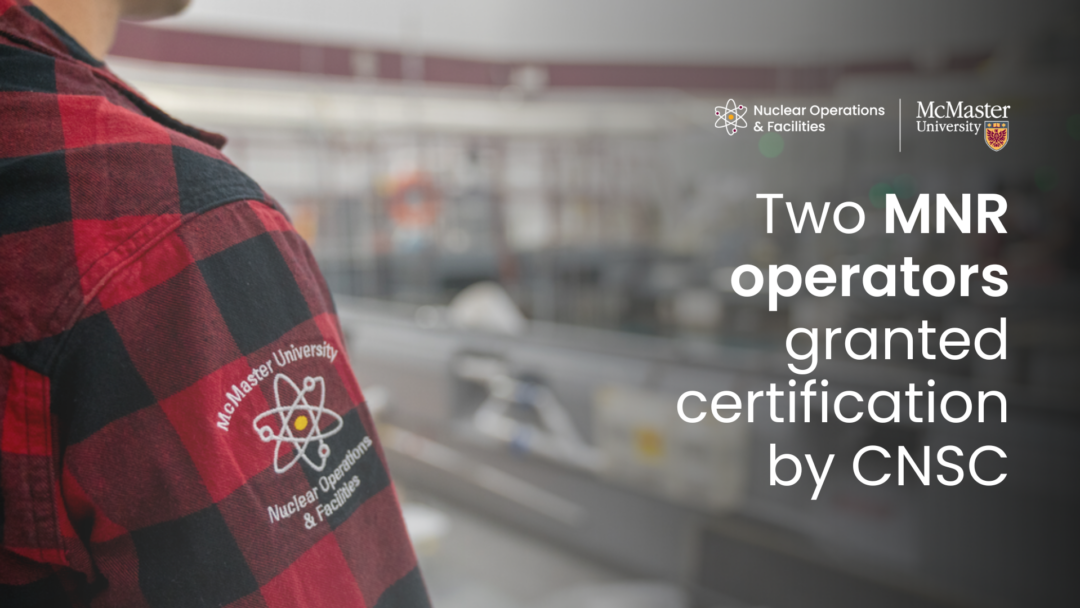Two McMaster Nuclear Reactor operators granted certification by CNSC

Nuclear Operations & Facilities (NOF) is pleased to announce that two of our reactor operators – Matt Tellier and Brian D’Ortenzio – have been granted certification by the Canadian Nuclear Safety Commission (CNSC).
Both passed their final certification exam in the summer of 2024 and received their official notice of certification from the CNSC in December, bringing the number of certified reactor operators at the McMaster Nuclear Reactor (MNR) up to 10.
Matt Tellier graduated from Conestoga College with a certificate in power engineering. He previously worked as a nuclear operator at Ontario Power Generation and joined NOF in 2023.
Brian D’Ortenzio graduated from McMaster with a degree in life sciences. He previously worked at Laurentis Energy Partners as a radiation protection technician. He also joined NOF in 2023.
From inside the control room and on the experimental floor, reactor operators play an essential role in the day-to-day activities at MNR, ensuring the reactor continues to function efficiently and safely.
As part of the certification process, Tellier and D’Ortenzio were required to complete 480 hours of hands-on training inside the McMaster Nuclear Reactor, where they worked as assistant operators.
Josip Zic, McMaster’s interim Chief Nuclear Officer, salutes Tellier, D’Ortenzio and MNR’s entire operator crew for the work they do to ensure the reactor runs smoothly.
“Congratulations, Matt and Brian, on this well-deserved achievement. The McMaster Nuclear Reactor enables ground-breaking research for a cleaner, healthier world – and it’s thanks in large part to the dedication and skill of our growing operations team,” he says.
Derek Cappon, McMaster’s Director, Reactor Operations & Maintenance, congratulates Tellier and D’Ortenzio on their certification success and welcomes them as the newest certified members of MNR’s operator crew.
“Our reactor operators ensure the excellence of our facility, keeping the reactor maintained and operating to support cutting-edge research in areas like medical isotopes, clean energy, and materials. We’re thrilled to officially welcome Matt and Brian on board our reactor operations team,” he says.
The pathway to certification
The pathway to becoming a reactor operator involves a significant amount of initial and ongoing training, including regular recertification every five years.
Due to MNR’s unique design, operator training takes place almost entirely inside the reactor building. Reactor operators are trained in the relevant science fundamentals, reactor physics, radiation protection and safety programs, and equipment operation and repair.
In addition to training, candidates are required to operate reactor controls under the supervision of a certified operator for a minimum of 480 hours.
Once they have completed their training, candidates undergo oral exams conducted by McMaster’s Reactor Manager and Senior Health Physicist. If successful, they are required to sit for a 6-hour written certification examination which is reviewed and approved by CNSC staff, as well as NOF’s Operations Director and Training Manager. After careful review of each candidate’s training records and exam score, the CNSC grants the candidate certification.
By the time they are certified, MNR’s reactor operators have participated in approximately 2,500 hours of training and have completed at least 25 comprehensive written and on-the-job evaluations.
Nevertheless, every five years each reactor operator is required to undergo recertification, writing a new exam to ensure continued excellence in operations.
News